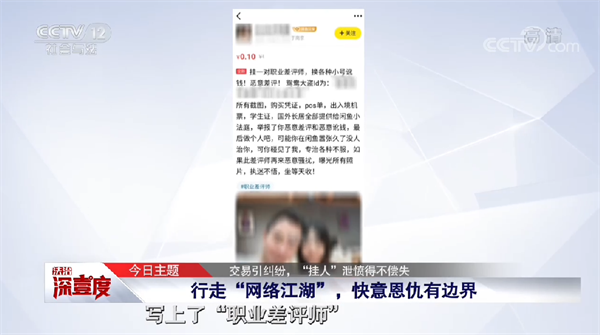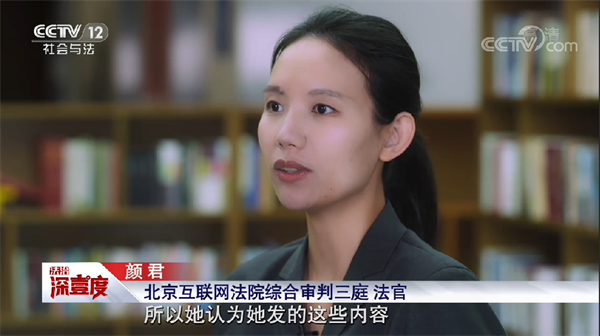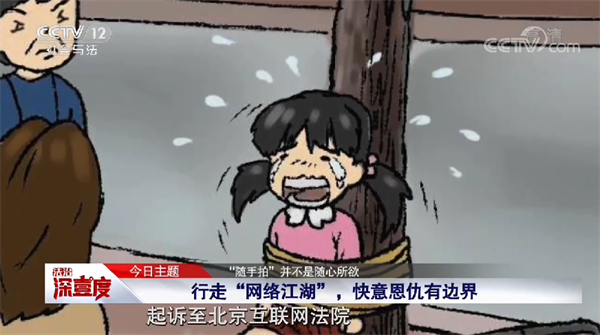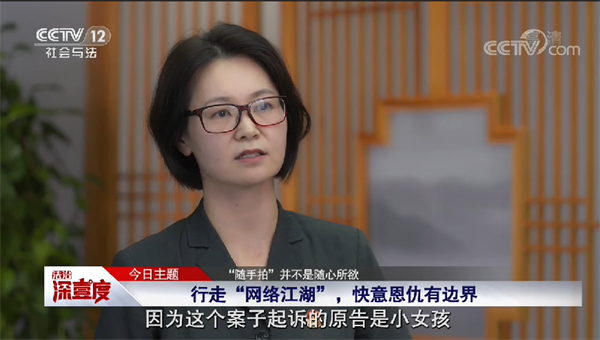Cases illustrating behavior boundaries in cyberspace
Case 1

The Plaintiff surnamed Wang bought a coat from an online trading platform for second-hand items. The seller surnamed Yu claimed the coat was newly bought from abroad but didn't fit her well. Upon receiving the coat, Wang believed the coat was fake. After communication with Yu in vain, Wang posted the link to the coat on the platform, offering to give it away for free as it was a fake product. Wang also attached related links to Yu's store.
Yu soon discovered Wang's post and in response posted Wang's family photo and claimed to sell it for 0.1 yuan ($0.014). Yu also included such description as "professional negative comment givers" with the photo. Wang therefore sued Yu at the Beijing Internet Court (BIC), claiming infringement of her rights to likeness and to reputation.
The BIC first investigated whether Wang was "a professional negative comment giver". The so-called professional negative comment giver would have records of accumulative purchases, which Wang did not have. Therefore, the court concluded that Wang was not a professional negative comment giver. On the other hand, Yu could not provide evidence to prove the authenticity of the coat, leading the court to conclude that the coat was a fake product based on Yu's failure to discharge her burden of proof.
Yu then argued that Wang exposed her store first with inappropriate words. And Yu's action was only justifiable defense. The BIC decided that Yu's defense was beyond the reasonable limitation and constituted infringement of Wang's rights to likeness and to reputation. It ruled that Yu should post a statement of apology to Wang and compensate Wang for mental distress.

Based on this case, the BIC suggested that when suffering from attacks in cyberspace, people can take legitimate measures to protect their own rights and benefits, such as notifying the online platform to delete related inappropriate words and opinions, posting clarifications on their own webpages, and seeking legal help. Information on the internet disseminates ultra-fast, which requires a more rational and civilized approach in voicing opinions online, so as to keep cyberspace free of negative emotions.
Case 2

One morning in 2019 a six-year-old girl was crying about not wanting to go to school. Her parents tied her up on a tree by the road and started lecturing her. A passer-by recorded a nine-second video and uploaded it on an online social platform. The video included images of the girl's face and her underpants, as well as indications that the father tried to stop the shooting. The video went viral online and caught attention from the police. On the night of the same day, the passer-by deleted the online video.
However, the parents sued the passer-by at the BIC in the girl's name, claiming infringement of the girl's rights to likeness, to privacy and to reputation by disseminating the video without permission. The passer-by argued that the purpose of the dissemination was to stop potential infringement of the girl's rights by supervision of public opinions.
The Article 999 in the Civil Code stipulates that "the name, entity name, likeness, personal information, and the like, of a person of the civil law may be reasonably used by those engaged in news reporting, supervision of public opinions, or the like, for public interests, except that civil liability shall be borne in accordance with law where the use unreasonably harms the personality rights of the person". In handling this case, the BIC abided to the principle of "for the best interest of the minor" provided by the Law of the Protection of Minors.
Although the passer-by uploaded the video for a public opinion supervision purpose, the sensitive images such as the girl's face should be blurred beforehand, or the video could be submitted to the police. The open dissemination of the video did infringe the girl's personality right. The video also showed that the girl's guardian tried to stop the video shooting, not wanting it to be publicized.
The right to privacy is the undisturbed private life of the right holder and right holder's private space, private activities, and private information that the right holder does not want to be known to others. To determine privacy and its scope should be based on right holder's intention and the general social cognition. In this case, although the parenting behavior occurred in a public setting, the scope of observation was limited, and information pertaining to the event would be lessened as the video spread. The passer-by maximized the information of the original scene by taking the video, where facial features of the girl were very clear. The girl's underwear was also exposed during her crying and struggling. Massive online dissemination of such a video would cause severe damage to the girl's personality rights, including the rights to privacy and to likeness.
However, the passer-by didn't infringe the girl's right to reputation, according to the BIC. The filming was an objective recording of what was happening. There were no adaptations, and no action of insulting or slandering. Besides, the video may impact the parents' social status, but did not impact that of the girl.

The BIC's final judgment was that the passer-by infringed upon the girl's rights to likeness and to privacy and should bear corresponding liabilities. The judgement was accepted by both parties. Furthermore, due to the fact that the defendant deleted the video on the same day of posting it, the social platform was not liable.
Afterwards, the BIC delivered a judicial suggestion to the involved social platform, urging it to set up special procedures for examining minor-related content so as to maximize protection of minors.

 Beijing Internet Court Lawsuit Service WeChat Account
Beijing Internet Court Lawsuit Service WeChat Account  Beijing Internet Court WeChat Account
Beijing Internet Court WeChat Account